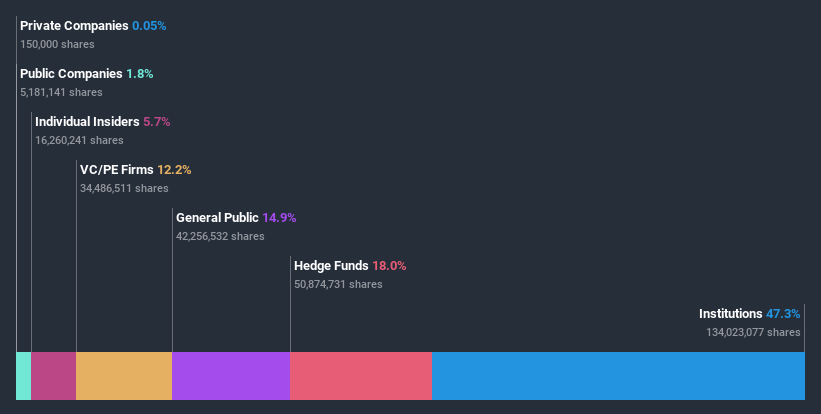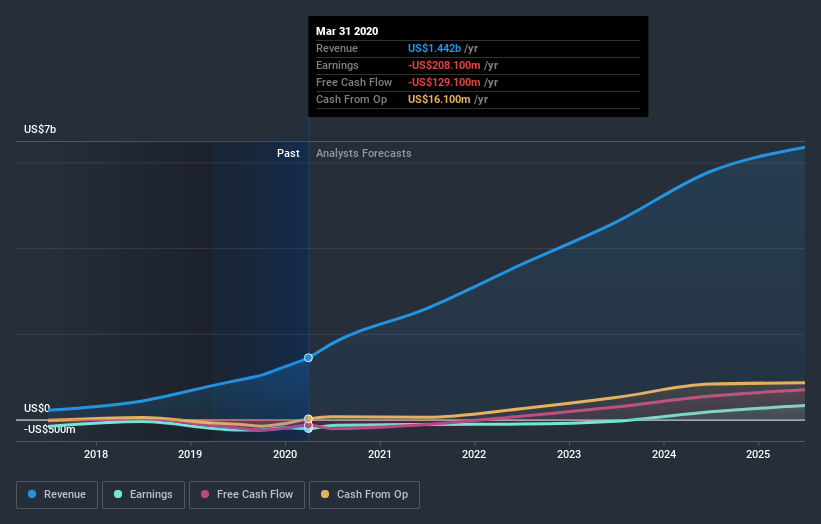Do Insiders Own Lots Of Shares In Peloton Interactive, Inc. (NASDAQ:PTON)?

Want to participate in a short research study? Help shape the future of investing tools and earn a $40 gift card!
A look at the shareholders of Peloton Interactive, Inc. (NASDAQ:PTON) can tell us which group is most powerful. Insiders often own a large chunk of younger, smaller, companies while huge companies tend to have institutions as shareholders. Warren Buffett said that he likes "a business with enduring competitive advantages that is run by able and owner-oriented people." So it's nice to see some insider ownership, because it may suggest that management is owner-oriented.
Peloton Interactive is a pretty big company. It has a market capitalization of US$17b. Normally institutions would own a significant portion of a company this size. Our analysis of the ownership of the company, below, shows that institutions own shares in the company. Let's take a closer look to see what the different types of shareholder can tell us about Peloton Interactive.
See our latest analysis for Peloton Interactive
What Does The Institutional Ownership Tell Us About Peloton Interactive?
Institutions typically measure themselves against a benchmark when reporting to their own investors, so they often become more enthusiastic about a stock once it's included in a major index. We would expect most companies to have some institutions on the register, especially if they are growing.
Peloton Interactive already has institutions on the share registry. Indeed, they own a respectable stake in the company. This suggests some credibility amongst professional investors. But we can't rely on that fact alone, since institutions make bad investments sometimes, just like everyone does. If multiple institutions change their view on a stock at the same time, you could see the share price drop fast. It's therefore worth looking at Peloton Interactive's earnings history, below. Of course, the future is what really matters.
Our data indicates that hedge funds own 18% of Peloton Interactive. That worth noting, since hedge funds are often quite active investors, who may try to influence management. Many want to see value creation (and a higher share price) in the short term or medium term. Tiger Global Management LLC is currently the company's largest shareholder with 18% of shares outstanding. With 6.3% and 6.2% of the shares outstanding respectively, FMR LLC and Baillie Gifford & Co. are the second and third largest shareholders. In addition, we found that John Foley, the CEO has 0.0224771 of the shares allocated to his name
We also observed that the top 8 shareholders account for more than half of the share register, with a few smaller shareholders to balance the interests of the larger ones to a certain extent.
Researching institutional ownership is a good way to gauge and filter a stock's expected performance. The same can be achieved by studying analyst sentiments. Quite a few analysts cover the stock, so you could look into forecast growth quite easily.
Insider Ownership Of Peloton Interactive
While the precise definition of an insider can be subjective, almost everyone considers board members to be insiders. Management ultimately answers to the board. However, it is not uncommon for managers to be executive board members, especially if they are a founder or the CEO.
Most consider insider ownership a positive because it can indicate the board is well aligned with other shareholders. However, on some occasions too much power is concentrated within this group.
I can report that insiders do own shares in Peloton Interactive, Inc.. It is a very large company, and board members collectively own US$952m worth of shares (at current prices). I sometimes take an interest in whether they have been buying or selling.
General Public Ownership
The general public holds a 15% stake in PTON. While this group can't necessarily call the shots, it can certainly have a real influence on how the company is run.
Private Equity Ownership
With a stake of 12%, private equity firms could influence the PTON board. Some might like this, because private equity are sometimes activists who hold management accountable. But other times, private equity is selling out, having taking the company public.
Next Steps:
It's always worth thinking about the different groups who own shares in a company. But to understand Peloton Interactive better, we need to consider many other factors. Consider risks, for instance. Every company has them, and we've spotted 2 warning signs for Peloton Interactive you should know about.
But ultimately it is the future, not the past, that will determine how well the owners of this business will do. Therefore we think it advisable to take a look at this free report showing whether analysts are predicting a brighter future.
NB: Figures in this article are calculated using data from the last twelve months, which refer to the 12-month period ending on the last date of the month the financial statement is dated. This may not be consistent with full year annual report figures.
This article by Simply Wall St is general in nature. It does not constitute a recommendation to buy or sell any stock, and does not take account of your objectives, or your financial situation. We aim to bring you long-term focused analysis driven by fundamental data. Note that our analysis may not factor in the latest price-sensitive company announcements or qualitative material. Simply Wall St has no position in any stocks mentioned.
Have feedback on this article? Concerned about the content? Get in touch with us directly. Alternatively, email editorial-team@simplywallst.com.

 Yahoo Finance
Yahoo Finance 

